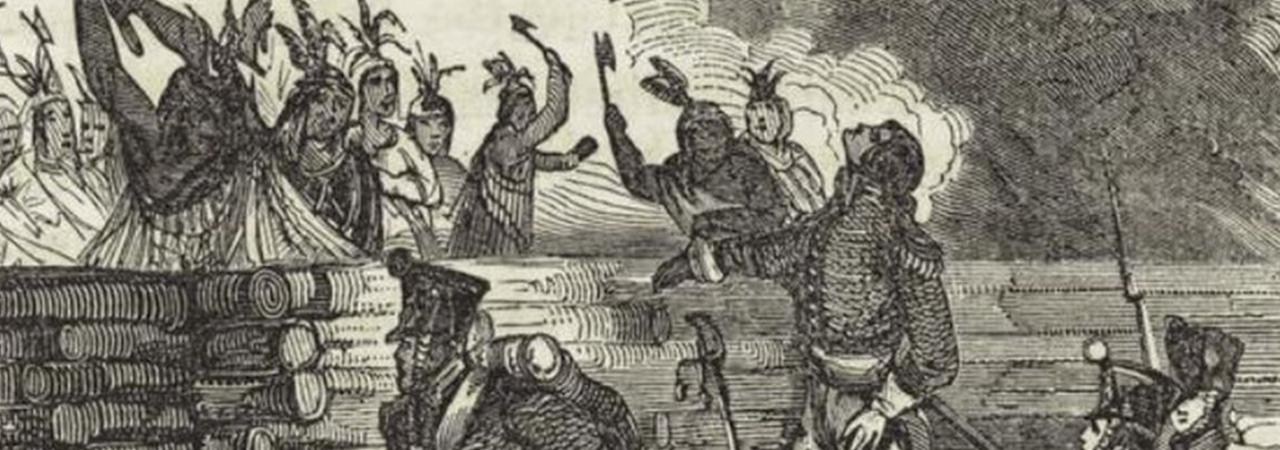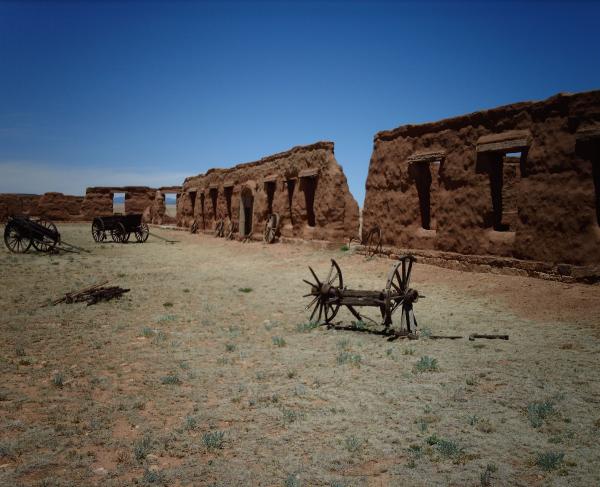The Creek War of 1813-1814

While the armies of Great Britain and the United States grappled for the Old Northwest and along the Canadian front from 1812 to 1813, a new war erupted with the Creek Nation on the southern frontier. The conflict traced its roots to the end of the American Revolution. With independence won, American settlers pushed into Creek homelands of western Georgia and Alabama. The onslaught evoked a series of treaties in which the Creeks ceded lands to the United States. This encroachment split the tribe as factions evolved that both resisted and embraced the expansion of white society.
Tensions rose when the Shawnee chief Tecumseh visited the Creek towns in the spring of 1811. Tecumseh brought a message of Indian unification and resistance to further American settlement. His words further split the Creeks as the militant sect, known as Red Sticks, asserted their control and a small civil war exploded within the tribe.
The internal conflict amongst the Creeks soon turned into an all-out war. On August 30, 1813, about 1,000 Red Sticks attacked Fort Mims, northeast of Mobile and killed all the inhabitants. The event sent shockwaves through the Alabama and Mississippi Territories along with Georgia and Tennessee. Tennessee governor Willie Blount directed the commander of the state militia, Maj. Gen. Andrew Jackson to mobilize a force to suppress the Creeks. Authorities in Georgia and Mississippi also planned offensives, but the main effort would be led by Jackson.
Jackson moved his men into Alabama and constructed a supply base, Fort Strother. In early November, Jackson dispatched Col. John Coffee with a mounted force to the Creek town of Tallushatchee. Coffee’s men attacked and destroyed the town on November 3. Jackson followed up Coffee’s victory six days later by attacking Talladega, held by Red Stick chief William Weatherford and earned another victory over the Creeks.
At the end of the month, Georgia militia under Brig. Gen. John Floyd struck the towns of Autosee and Tallassee. Floyd burned the dwellings before withdrawing to the east. Two days before Christmas, Mississippians led by Brig. Gen. Ferdinand Claiborne and supported by friendly Choctaws led by Pushmataha attacked the village of Eccanachaca or the Holy Ground, near modern Montgomery. Claiborne inflicted a number of casualties and burned the town. Expiration of enlistments as well as supply problems compelled the Americans to suspend operations until early the following year.
Jackson’s command left Fort Strother on January 17, 1814. His destination was the main Red Stick town of Tohopeka. Situated on land between a major curve of the Tallapoosa River, it was known to whites as Horseshoe Bend. Rather than await Jackson’s movement, the Red Sticks sallied out of their town and struck the Americans on January 22 in their camp along Emuckfau Creek. Jackson’s men fought well and managed to repulse the assault. Still, Jackson decided to withdraw due to a lack of supplies and returned to Fort Strother.
Jackson set out again on March 14. Arriving opposite Horseshoe Bend on March 27, he found the Red Sticks, under Menewa, entrenched behind a massive log breastwork. After an artillery barrage, Jackson sent Coffee, supported by friendly Creeks, and Cherokees on a flanking maneuver across the river while he launched a frontal assault with the 39th U.S. Infantry. The Regulars managed to break through the position and period of brutal fighting ensued through the remainder of the day. The Red Sticks sustained 75% casualties. Horseshoe Bend effectively brought an end to the fighting as those Red Sticks still in resistance fled to the safety of Spanish Florida.
Jackson met with the militant chiefs to negotiate a treaty at Fort Jackson, Alabama Territory, in early August. For igniting the war, Jackson demanded 23 million acres of Creek land. The chiefs acquiesced and signed the terms on August 9. Many Creeks continued to reside in the Old Southwest for the next two decades until forcibly removed to the Indian Territory in the fall of 1836.
Related Battles
276
1,063


